Adams J.T. Empire on the Seven Seas. The British Empire 1784-1939
Подождите немного. Документ загружается.

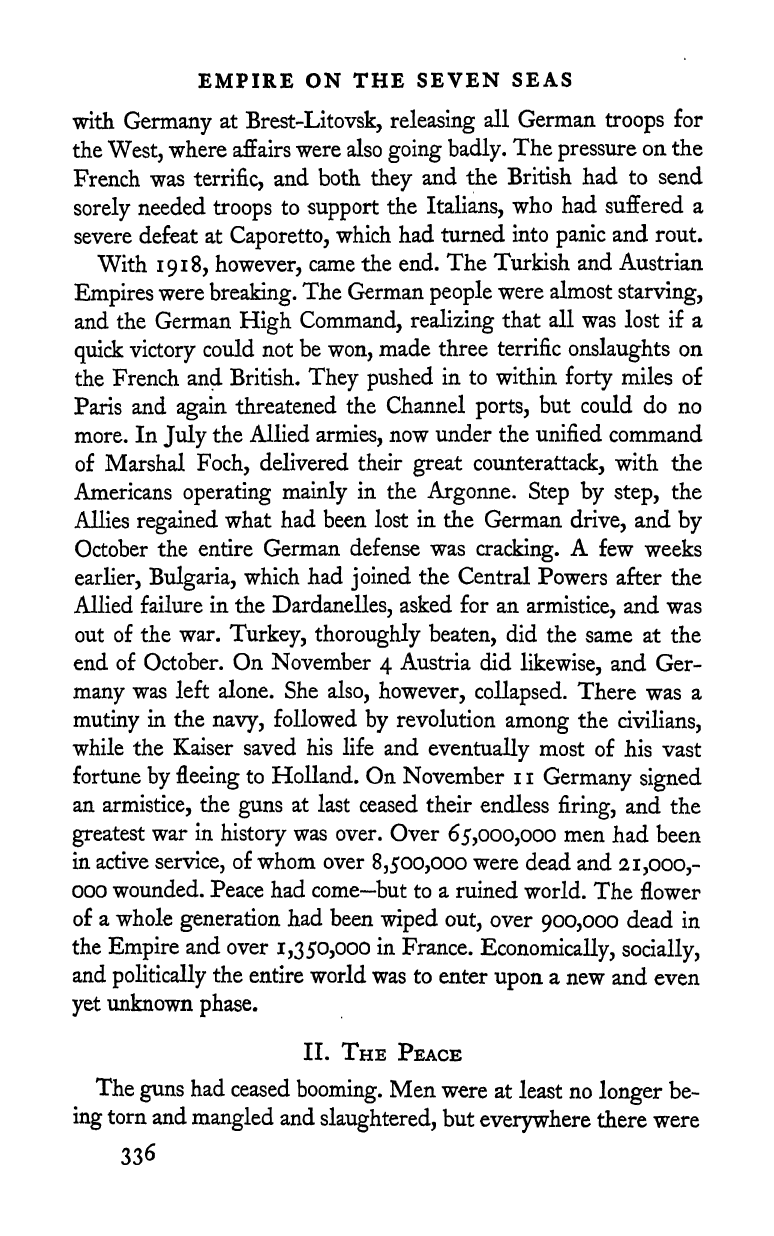
EMPIRE ON
THE
SEVEN
SEAS
with
Germany
at
Brest-Litovsk,
releasing
all
German
troops
for
the
West,
where
affairs were also
going
badly.
The
pressure
on the
French was
terrific,
and
both
they
and
the
British had to send
sorely
needed
troops
to
support
the
Italians,
who
had suffered a
severe
defeat at
Caporetto,
which
had
turned
into
panic
and rout.
With
1918,
however,
came
the end.
The Turkish
and
Austrian
Empires
were
breaking.
The
German
people
were
almost
starving,
and
the
German
High
Command,
realizing
that
all
was
lost
if a
quick
victory
could
not
be
won,
made
three terrific
onslaughts
on
the
French
and British.
They pushed
in to
within
forty
miles
of
Paris and
again
threatened
the
Channel
ports,
but could
do no
more.
In
July
the
Allied
armies,
now
under
the
unified
command
of
Marshal
Foch,
delivered their
great
counterattack,
with
the
Americans
operating
mainly
in
the
Argonne.
Step
by
step,
the
Allies
regained
what
had been lost
in the
German
drive,
and
by
October
the
entire
German
defense
was
cracking.
A
few
weeks
earlier,
Bulgaria,
which
had
joined
the Central
Powers after
the
Allied
failure
in
the
Dardanelles,
asked
for
an
armistice,
and
was
out
of
the
war.
Turkey,
thoroughly
beaten,
did
the
same at
the
end of
October.
On
November
4
Austria
did
likewise,
and Ger-
many
was
left alone. She
also,
however,
collapsed.
There
was
a
mutiny
in
the
navy,
followed
by
revolution
among
the
civilians,
while
the
Kaiser saved his life
and
eventually
most of
his vast
fortune
by
fleeing
to Holland.
On
November 1
1
Germany
signed
an
armistice,
the
guns
at
last
ceased their
endless
firing,
and
the
greatest
war
in
history
was over.
Over
65,000,000
men
had been
in
active
service,
of
whom
over
8,500,000
were
dead
and
21,000,-
000
wounded.
Peace
had
come
but
to
a
ruined
world.
The
flower
of
a
whole
generation
had been
wiped
out,
over
900,000
dead
in
the
Empire
and
over
1,350,000
in
France.
Economically,
socially,
and
politically
the
entire
world
was
to enter
upon
a
new and
even
yet
unknown
phase.
II.
THE
PEACE
The
guns
had
ceased
booming.
Men
were
at
least
no
longer
be-
ing
torn
and
mangled
and
slaughtered,
but
everywhere
there
were
336
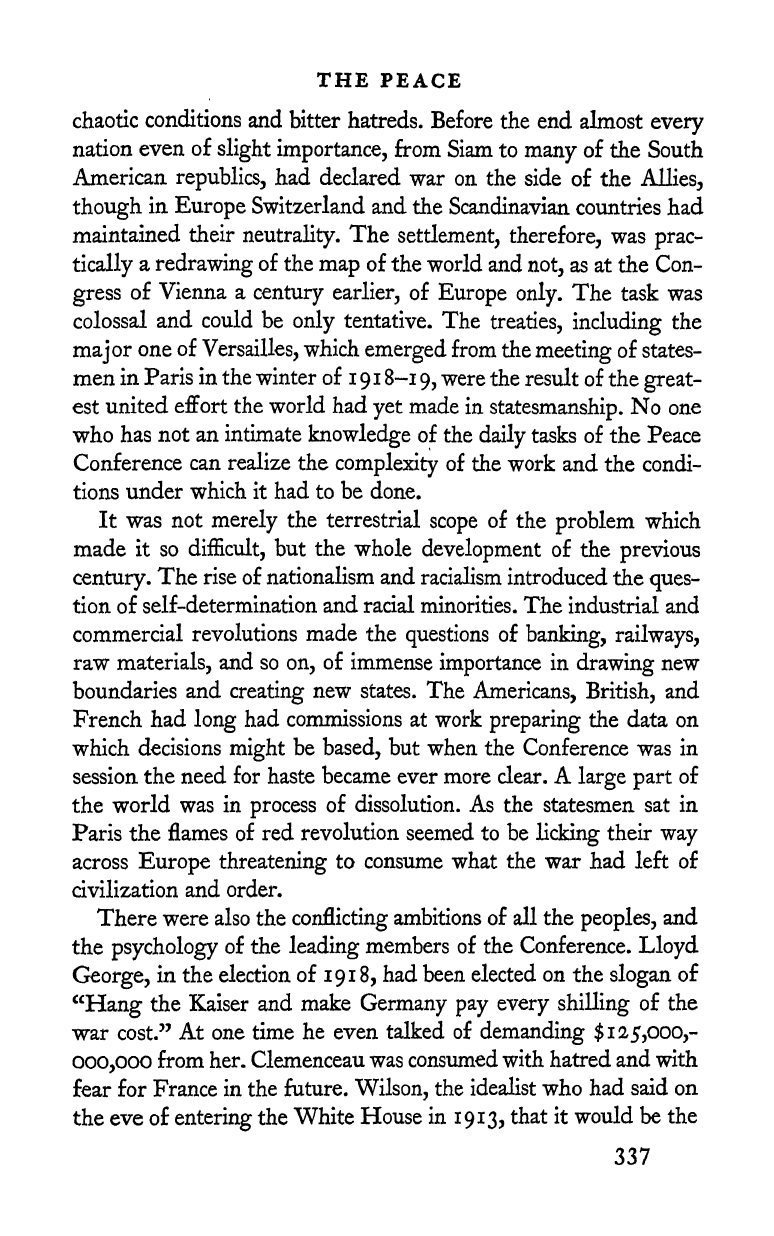
THE
PEACE
chaotic
conditions
and
bitter
hatreds. Before
the end
almost
every
nation
even
of
slight
importance,
from Siam
to
many
of
the South
American
republics,
had
declared
war on
the side
of the
Allies,
though
in
Europe
Switzerland
and
the
Scandinavian countries
had
maintained
their
neutrality.
The
settlement,
therefore,
was
prac-
tically
a
redrawing
of
the
map
of
the
world
and
not,
as
at
the
Con-
gress
of Vienna
a
century
earlier,
of
Europe
only.
The task was
colossal
and could
be
only
tentative. The
treaties,
including
the
major
one
of
Versailles,
which
emerged
from
the
meeting
of states-
men
in Paris
in
the winter
of
1918-1
9,
were
the
result of the
great-
est
united effort
the
world
had
yet
made
in
statesmanship.
No
one
who
has
not an intimate
knowledge
of
the
daily
tasks
of the
Peace
Conference
can realize
the
complexity
of
the
work and
the
condi-
tions
under
which
it had to
be
done.
It
was
not
merely
the
terrestrial
scope
of
the
problem
which
made
it so
difficult,
but
the
whole
development
of the
previous
century.
The
rise
of nationalism and
racialism introduced
the
ques-
tion
of
self-determination
and
racial minorities.
The
industrial and
commercial
revolutions
made
the
questions
of
banking, railways,
raw
materials,
and so
on,
of
immense
importance
in
drawing
new
boundaries
and
creating
new
states.
The
Americans,
British,
and
French had
long
had
commissions at
work
preparing
the
data
on
which
decisions
might
be
based,
but when the
Conference was
in
session the
need for haste
became
ever more clear. A
large
part
of
the
world
was
in
process
of dissolution. As
the
statesmen
sat in
Paris the
flames
of
red
revolution
seemed to be
licking
their
way
across
Europe
threatening
to
consume
what
the war
had
left of
civilization
and
order.
There
were
also
the
conflicting
ambitions
of
all
the
peoples,
and
the
psychology
of
the
leading
members
of the Conference.
Lloyd
George,
in
the
election
of
1918,
had been elected
on
the
slogan
of
"Hang
the
Kaiser
and make
Germany
pay
every
shilling
of
the
war
cost."
At
one
time
he even
talked
of
demanding
$12,5,000,-
000,000
from her.
Clemenceau
was
consumed with hatred
and
with
fear
for
France
in
the
future.
Wilson,
the
idealist
who
had
said on
the
eve of
entering
the
White
House
in
1913,
that it
would
be
the
337
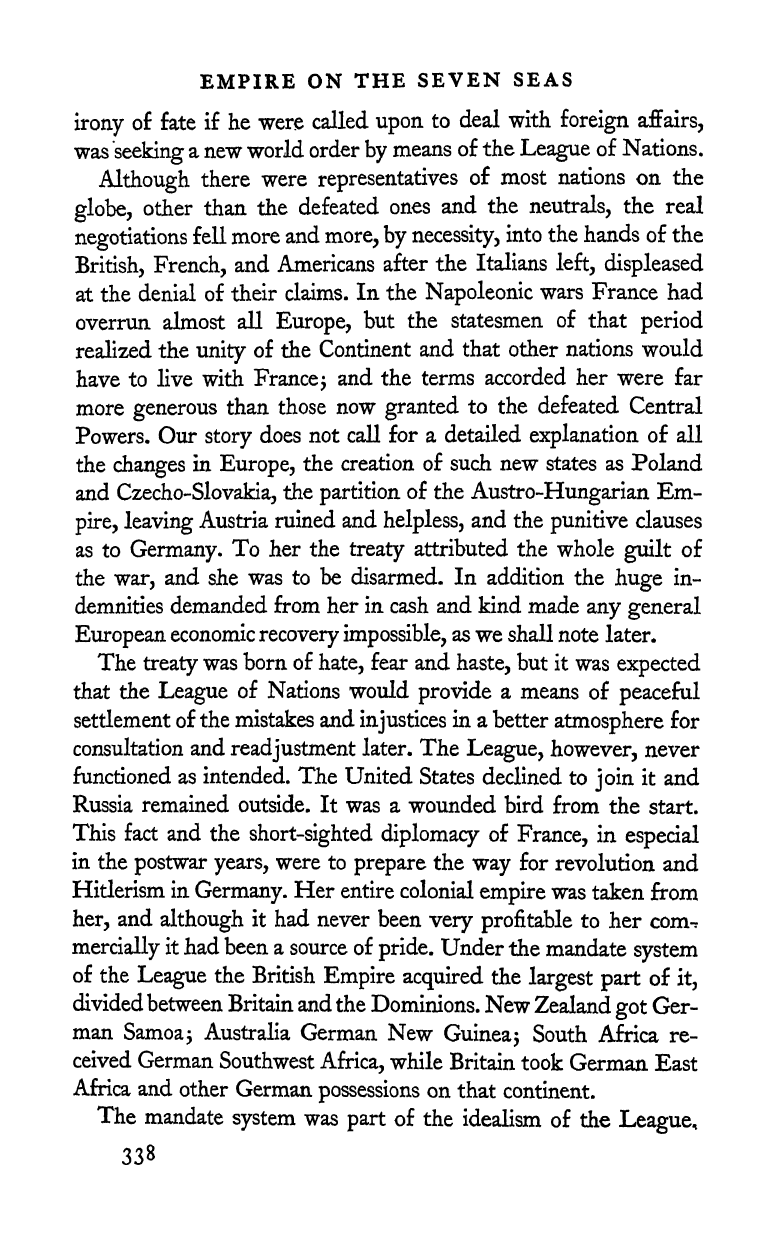
EMPIRE
ON
THE
SEVEN
SEAS
irony
of
fate
if
he
were
called
upon
to
deal with
foreign
affairs,
was
seeking
a
new world
order
by
means
of
the
League
of
Nations.
Although
there were
representatives
of most
nations
on
the
globe,
other
than
the
defeated
ones
and
the
neutrals,
the real
negotiations
fell
more
and
more,
by
necessity,
into the hands
of the
British,
French,
and
Americans
after
the
Italians
left,
displeased
at
the
denial
of
their
claims.
In
the
Napoleonic
wars
France
had
overrun
almost
all
Europe,
but
the
statesmen
of
that
period
realized
the
unity
of
the
Continent
and
that
other
nations
would
have
to live
with
France;
and the
terms accorded
her
were far
more
generous
than
those
now
granted
to
the
defeated
Central
Powers.
Our
story
does
not call for a
detailed
explanation
of all
the
changes
in
Europe,
the
creation
of such
new
states
as
Poland
and
Czecho-Slovakia,
the
partition
of
the
Austro-Hungarian
Em-
pire,
leaving
Austria
ruined and
helpless,
and
the
punitive
clauses
as
to
Germany.
To her
the
treaty
attributed the
whole
guilt
of
the
war,
and she
was
to be
disarmed.
In
addition the
huge
in-
demnities
demanded
from
her
in
cash
and
kind made
any
general
European
economic
recovery
impossible,
as
we
shall
note
later.
The
treaty
was
born
of
hate,
fear
and
haste,
but it
was
expected
that
the
League
of
Nations
would
provide
a
means
of
peaceful
settlement
of
the
mistakes
and
injustices
in a
better
atmosphere
for
consultation
and
readjustment
later.
The
League,
however,
never
functioned as intended. The United
States
declined to
join
it
and
Russia remained outside.
It
was
a
wounded bird
from
the
start.
This
fact
and
the
short-sighted
diplomacy
of
France,
in
especial
in
the
postwar
years,
were
to
prepare
the
way
for
revolution and
Hitlerism
in
Germany.
Her
entire
colonial
empire
was
taken
from
her,
and
although
it
had
never
been
very
profitable
to her
com-r
mercially
it had
been
a
source
of
pride.
Under
the
mandate
system
of
the
League
the
British
Empire
acquired
the
largest part
of
it,
divided
between
Britain
and the
Dominions.
New
Zealand
got
Ger-
man
Samoa;
Australia
German
New
Guinea;
South
Africa
re-
ceived
German
Southwest
Africa,
while
Britain
took
German
East
Africa
and
other
German
possessions
on that
continent.
The
mandate
system
was
part
of
the
idealism
of the
League,
338
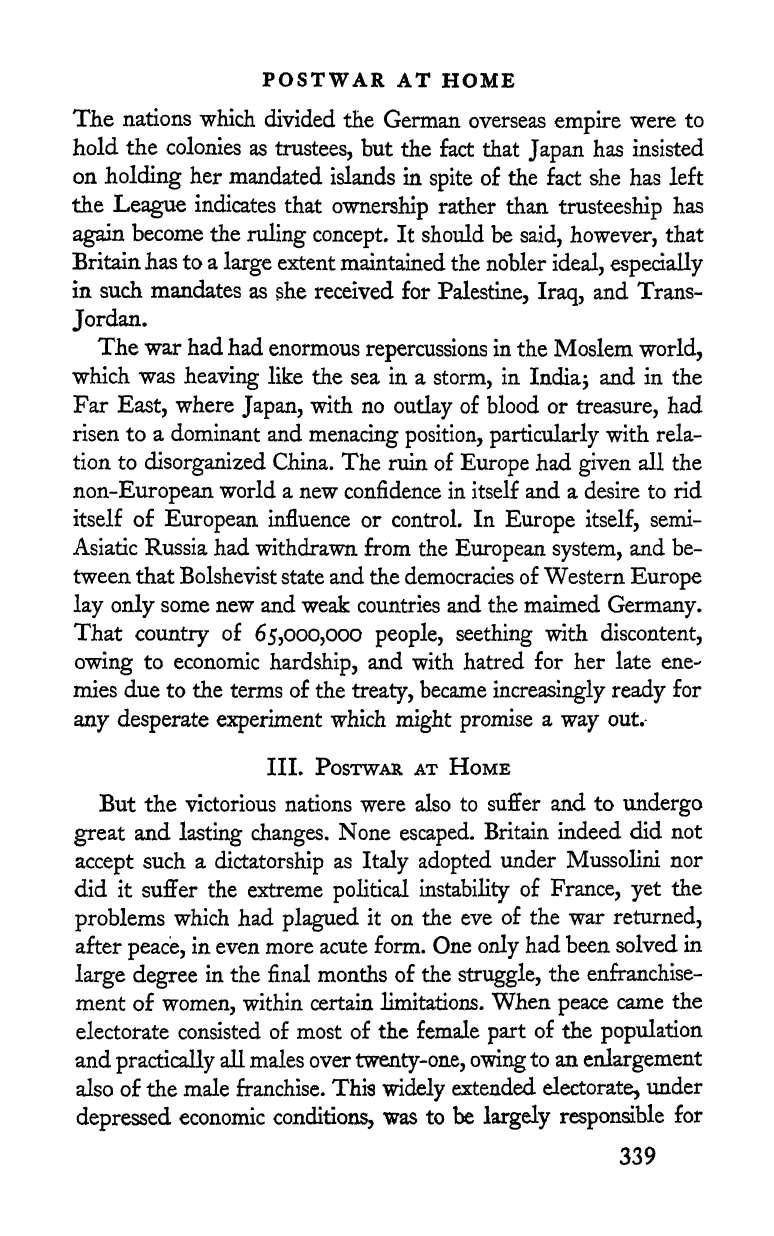
POSTWAR
AT
HOME
The
nations
which
divided
the
German overseas
empire
were
to
hold
the
colonies
as
trustees,
but
the fact
that
Japan
has insisted
on
holding
her
mandated
islands in
spite
of
the
fact she has
left
the
League
indicates
that
ownership
rather
than
trusteeship
has
again
become
the
ruling concept*
It should
be
said,
however,
that
Britain
has to a
large
extent
maintained
the nobler
ideal,
especially
in
such
mandates
as
she
received
for
Palestine,
Iraq,
and
Trans-
Jordan*
The war
had had
enormous
repercussions
in the
Moslem
world,
which
was
heaving
like
the sea in a
storm,
in
India;
and
in
the
Far
East,
where
Japan,
with no
outlay
of blood or
treasure,
had
risen
to
a
dominant
and
menacing position, particularly
with
rela-
tion to
disorganized
China.
The ruin
of
Europe
had
given
all the
non-European
world
a
new
confidence in
itself
and
a desire
to
rid
itself
of
European
influence
or
control.
In
Europe
itself,
semi-
Asiatic
Russia
had
withdrawn
from the
European
system,
and
be-
tween
that
Bolshevist
state and
the
democracies of Western
Europe
lay
only
some new
and
weak countries and
the maimed
Germany.
That
country
of
65,000,000
people,
seething
with
discontent,
owing
to
economic
hardship,
and
with
hatred
for
her late ene-
mies
due
to the
terms
of
the
treaty,
became
increasingly
ready
for
any
desperate
experiment
which
might
promise
a
way
out.
III. POSTWAR
AT
HOME
But the
victorious nations
were
also to
suffer
and
to
undergo
great
and
lasting changes.
None
escaped.
Britain
indeed did
not
accept
such
a
dictatorship
as
Italy
adopted
under Mussolini
nor
did it
suffer
the
extreme
political
instability
of
France,
yet
the
problems
which
had
plagued
it
on
the
eve
of the
war
returned,
after
peace,
in even
more
acute
form. One
only
had
been
solved
in
large degree
in
the
final months
of
the
struggle,
the
enfranchise-
ment
of
women,
within
certain limitations.
When
peace
came
the
electorate consisted
of
most of
the female
part
of
the
population
and
practically
all males
over
twenty-one,
owing
to an
enlargement
also of
the
male
franchise.
This
widely
extended
electorate,
under
depressed
economic
conditions,
was to
be
largely
responsible
for
339
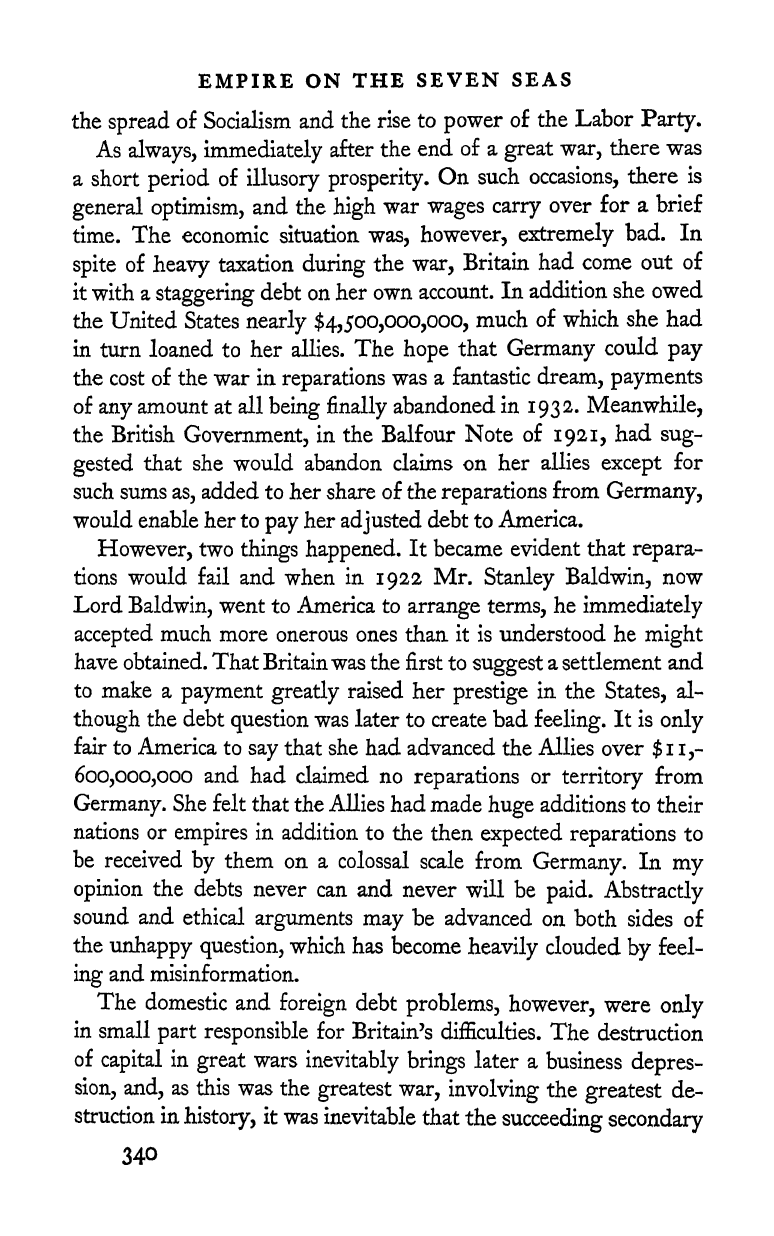
EMPIRE
ON
THE
SEVEN
SEAS
the
spread
of
Socialism
and
the
rise
to
power
of
the
Labor
Party.
As
always,
immediately
after the
end
of
a
great
war,
there
was
a
short
period
of
illusory
prosperity.
On
such
occasions,
there
is
general optimism,
and the
high
war
wages
carry
over
for
a
brief
time. The
economic
situation
was,
however,
extremely
bad.
In
spite
of
heavy
taxation
during
the
war,
Britain
had
come
out
of
it
with
a
staggering
debt
on
her
own
account.
In
addition she
owed
the
United
States
nearly
$4,500,000,000,
much
of
which she had
in
turn loaned to her
allies.
The
hope
that
Germany
could
pay
the
cost
of
the
war
in
reparations
was
a
fantastic
dream,
payments
of
any
amount
at
all
being
finally
abandoned in
1932.
Meanwhile,
the British
Government,
in
the Balfour Note
of
1921,
had
sug-
gested
that she would abandon
claims on her
allies
except
for
such sums
as,
added to her share of
the
reparations
from
Germany,
would
enable her to
pay
her
adjusted
debt
to
America.
However,
two
things
happened.
It became
evident
that
repara-
tions
would fail
and when
in
1922
Mr.
Stanley
Baldwin,
now
Lord
Baldwin,
went to
America to
arrange
terms,
he
immediately
accepted
much
more
onerous ones
than
it is
understood
he
might
have
obtained.
That Britain was
the first
to
suggest
a
settlement
and
to
make a
payment
greatly
raised
her
prestige
in
the
States,
al-
though
the
debt
question
was later
to
create bad
feeling.
It is
only
fair
to America
to
say
that
she
had
advanced
the
Allies
over
$i
i,~
600,000,000
and
had claimed
no
reparations
or
territory
from
Germany.
She felt
that
the Allies
had
made
huge
additions
to
their
nations
or
empires
in addition to
the
then
expected reparations
to
be
received
by
them on a
colossal
scale
from
Germany.
In
my
opinion
the
debts never can
and
never
will
be
paid.
Abstractly
sound
and
ethical
arguments may
be advanced
on
both
sides of
the
unhappy
question,
which
has
become
heavily
clouded
by
feel-
ing
and
misinformation.
The
domestic
and
foreign
debt
problems,
however,
were
only
in
small
part
responsible
for
Britain's
difficulties.
The
destruction
of
capital
in
great
wars
inevitably
brings
later
a
business
depres-
sion,
and,
as
this was
the
greatest
war,
involving
the
greatest
de-
struction in
history,
it
was
inevitable
that
the
succeeding
secondary
340
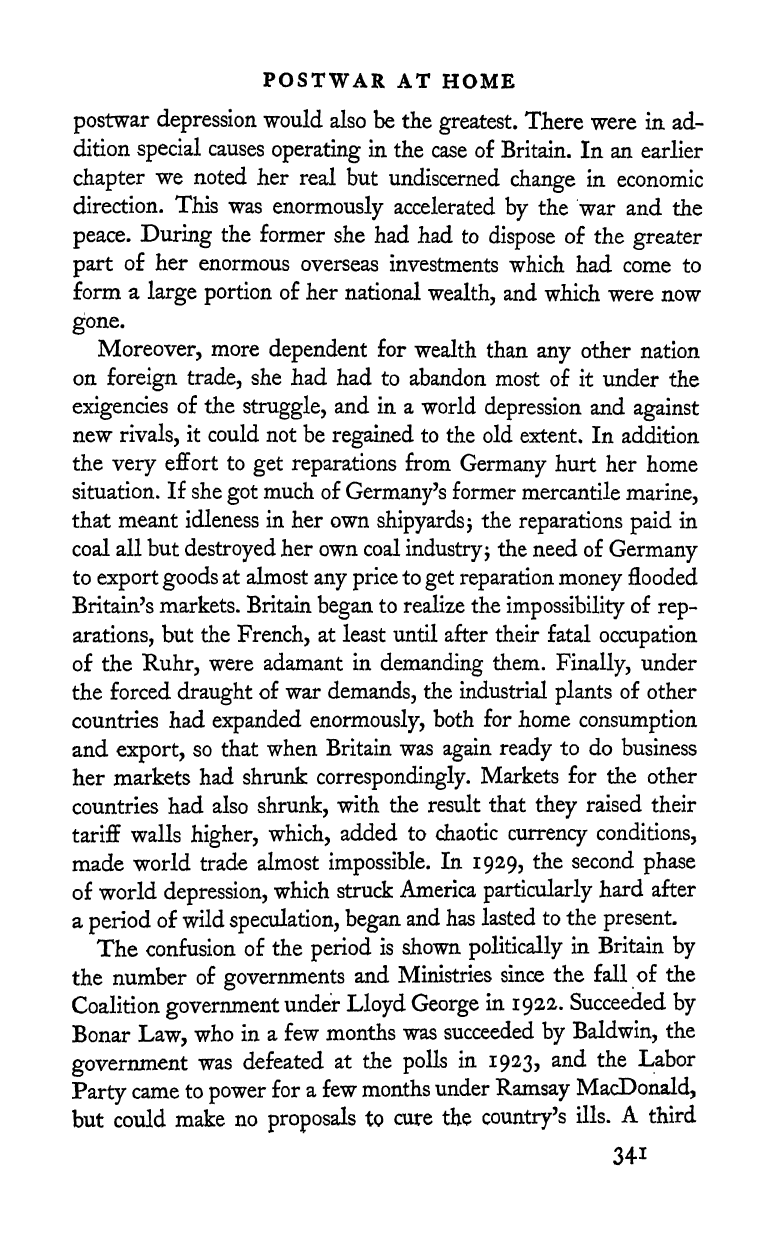
POSTWAR AT
HOME
postwar
depression
would
also be
the
greatest.
There
were
in ad-
dition
special
causes
operating
in
the
case
of Britain.
In an
earlier
chapter
we
noted
her
real
but
undiscerned
change
in
economic
direction.
This was
enormously
accelerated
by
the
war and the
peace.
During
the
former
she
had had
to
dispose
of
the
greater
part
of her
enormous
overseas
investments
which
had come to
form
a
large
portion
of her
national
wealth,
and
which were
now
gone.
Moreover,
more
dependent
for
wealth
than
any
other nation
on
foreign
trade,
she had
had
to
abandon
most
of
it
under
the
exigencies
of
the
struggle,
and
in
a
world
depression
and
against
new
rivals,
it could not
be
regained
to the
old
extent.
In
addition
the
very
effort
to
get reparations
from
Germany
hurt
her
home
situation.
If
she
got
much of
Germany's
former
mercantile
marine,
that meant
idleness
in
her own
shipyards}
the
reparations
paid
in
coal
all
but
destroyed
her
own
coal
industry}
the
need of
Germany
to
export
goods
at
almost
any
price
to
get
reparation
money
flooded
Britain's
markets.
Britain
began
to realize the
impossibility
of
rep-
arations,
but
the
French,
at least until
after
their
fatal
occupation
of
the
Ruhr,
were
adamant
in
demanding
them.
Finally,
under
the
forced
draught
of war
demands,
the industrial
plants
of
other
countries
had
expanded
enormously,
both
for
home
consumption
and
export,
so
that
when
Britain was
again
ready
to
do
business
her markets
had
shrunk
correspondingly.
Markets
for
the
other
countries
had
also
shrunk,
with
the result
that
they
raised
their
tariff
walls
higher,
which,
added to
chaotic
currency
conditions,
made
world
trade
almost
impossible.
In
1929,
the
second
phase
of
world
depression,
which
struck
America
particularly
hard
after
a
period
of
wild
speculation,
began
and
has
lasted to the
present.
The
confusion
of
the
period
is
shown
politically
in
Britain
by
the
number
of
governments
and
Ministries
since
the fall of
the
Coalition
government
under
Lloyd
George
in
1922.
Succeeded
by
Bonar
Law,
who
in
a
few
months
was
succeeded
by
Baldwin,
the
government
was
defeated
at
the
polls
in
1923,
and the
Labor
Party
came
to
power
for
a
few
months
under
Ramsay
MacDonald,
but could
make
no
proposals
to
cure
the
country's
ills.
A
third
341
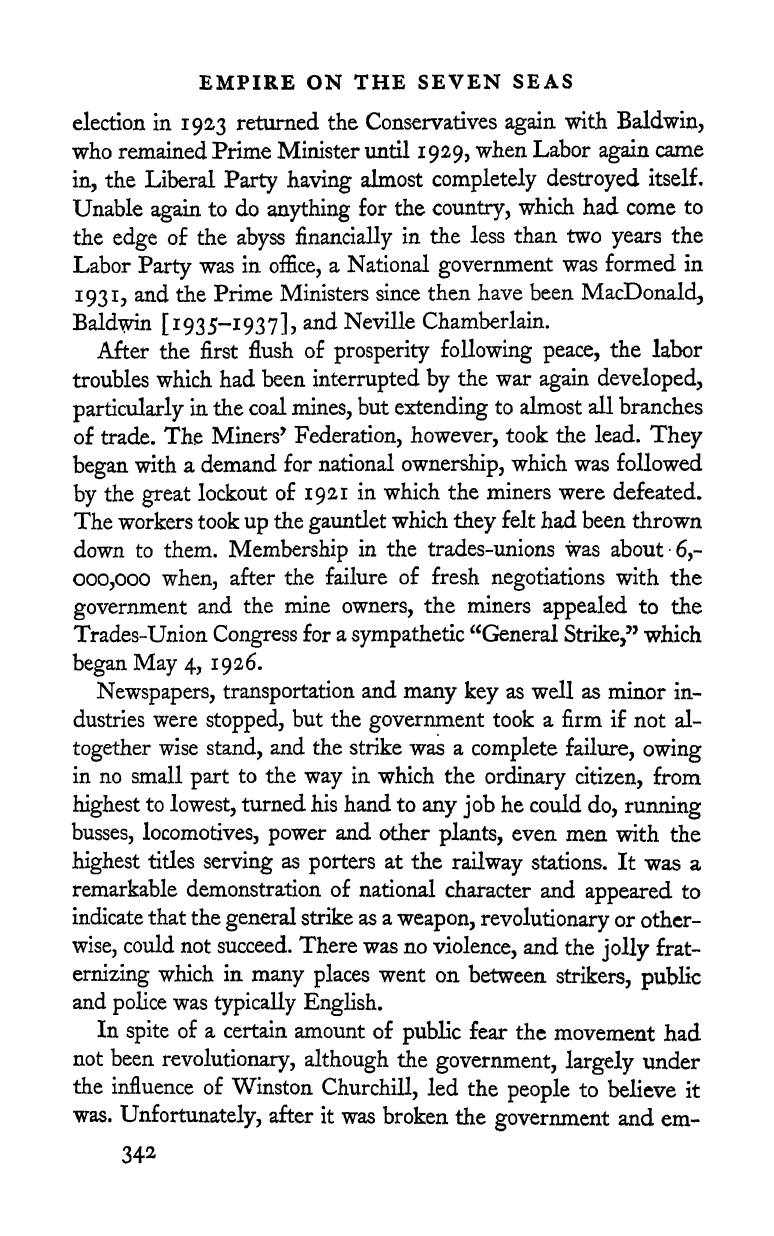
EMPIRE
ON
THE
SEVEN
SEAS
election in
1923
returned
the
Conservatives
again
with
Baldwin,
who
remained
Prime
Minister
until
1929,
when
Labor
again
came
in,
the Liberal
Party
having
almost
completely
destroyed
itself.
Unable
again
to
do
anything
for
the
country,
which
had
come
to
the
edge
of
the
abyss
financially
in
the
less
than two
years
the
Labor
Party
was
in
office,
a
National
government
was formed
in
1931,
and
the
Prime
Ministers
since
then have
been
MacDonald,
Baldwin
[1935-193?],
and
Neville
Chamberlain.
After
the
first
flush
of
prosperity
following
peace,
the labor
troubles
which had
been
interrupted by
the war
again
developed,
particularly
in
the
coal
mines,
but
extending
to
almost
all
branches
of
trade. The
Miners*
Federation, however,
took
the
lead.
They
began
with
a
demand
for
national
ownership,
which was followed
by
the
great
lockout
of
1921
in
which
the miners
were
defeated.
The
workers
took
up
the
gauntlet
which
they
felt
had
been
thrown
down
to
them.
Membership
in the
trades-unions
was
about
6,-
000,000
when,
after
the
failure
of
fresh
negotiations
with the
government
and
the
mine
owners,
the miners
appealed
to the
Trades-Union
Congress
for
a
sympathetic
"General
Strike,"
which
began
May
4, 1926.
Newspapers,
transportation
and
many key
as well
as
minor
in-
dustries
were
stopped,
but the
government
took
a
firm
if
not al-
together
wise
stand,
and the strike
was
a
complete
failure,
owing
in no small
part
to
the
way
in
which the
ordinary
citizen,
from
highest
to
lowest,
turned
his
hand to
any
job
he could
do,
running
busses,
locomotives,
power
and
other
plants,
even
men
with the
highest
titles
serving
as
porters
at
the
railway
stations.
It
was a
remarkable
demonstration of
national
character
and
appeared
to
indicate that
the
general
strike
as a
weapon,
revolutionary
or
other-
wise,
could
not
succeed.
There was no
violence,
and
the
jolly
frat-
ernizing
which
in
many
places
went
on
between
strikers,
public
and
police
was
typically
English.
In
spite
of
a
certain
amount
of
public
fear
the
movement
had
not been
revolutionary,
although
the
government,
largely
under
the
influence
of
Winston
Churchill,
led
the
people
to
believe
it
was.
Unfortunately,
after it
was
broken
the
government
and
em-
342
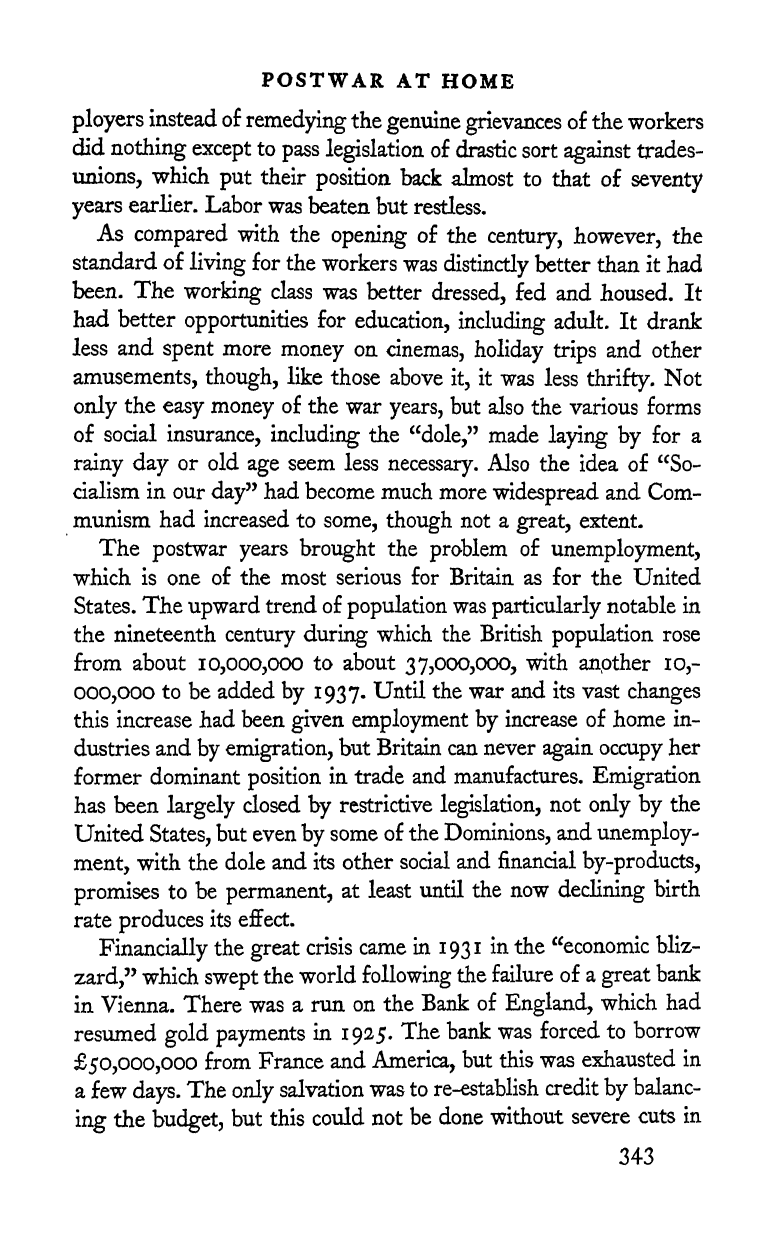
POSTWAR AT
HOME
ployers
instead of
remedying
the
genuine
grievances
of
the
workers
did
nothing
except
to
pass
legislation
of
drastic
sort
against
trades-
unions,
which
put
their
position
back
almost
to
that
of
seventy
years
earlier.
Labor
was
beaten but
restless.
As
compared
with
the
opening
of
the
century,
however,
the
standard
of
living
for
the
workers
was
distinctly
better
than it
had
been.
The
working
class
was
better
dressed,
fed and
housed.
It
had
better
opportunities
for
education,
including
adult.
It
drank
less
and
spent
more
money
on
cinemas,
holiday
trips
and
other
amusements,
though,
like
those
above
it,
it
was
less
thrifty.
Not
only
the
easy money
of the
war
years,
but
also
the various forms
of
social
insurance,
including
the
"dole,"
made
laying by
for
a
rainy
day
or
old
age
seem
less
necessary.
Also the idea of "So-
cialism
in
our
day"
had
become much
more
widespread
and
Com-
munism
had increased
to
some,
though
not a
great,
extent.
The
postwar
years
brought
the
problem
of
unemployment,
which is
one
of the
most
serious
for
Britain
as
for
the
United
States.
The
upward
trend
of
population
was
particularly
notable
in
the nineteenth
century
during
which the British
population
rose
from
about
10,000,000
to about
37,000,000,
with
another
10,-
000,000
to
be
added
by
1937.
Until
the
war and its
vast
changes
this
increase had
been
given
employment
by
increase
of
home
in-
dustries
and
by
emigration,
but
Britain can
never
again
occupy
her
former
dominant
position
in
trade
and manufactures.
Emigration
has been
largely
closed
by
restrictive
legislation,
not
only
by
the
United
States,
but even
by
some
of the
Dominions,
and
unemploy-
ment,
with
the
dole
and
its
other
social
and
financial
by-products,
promises
to
be
permanent,
at
least
until
the now
declining
birth
rate
produces
its
effect.
Financially
the
great
crisis
came in
1931
in
the
"economic
bliz-
zard,"
which
swept
the
world
following
the
failure
of a
great
bank
in Vienna.
There
was
a run
on
the
Bank
of
England,
which
had
resumed
gold
payments
in
1925.
The bank was
forced to
borrow
50,000,000
from
France
and
America,
but this was
exhausted
in
a
few
days.
The
only
salvation
was to
re-establish
credit
by
balanc-
ing
the
budget,
but
this
could
not
be
done without
severe
cuts in
343
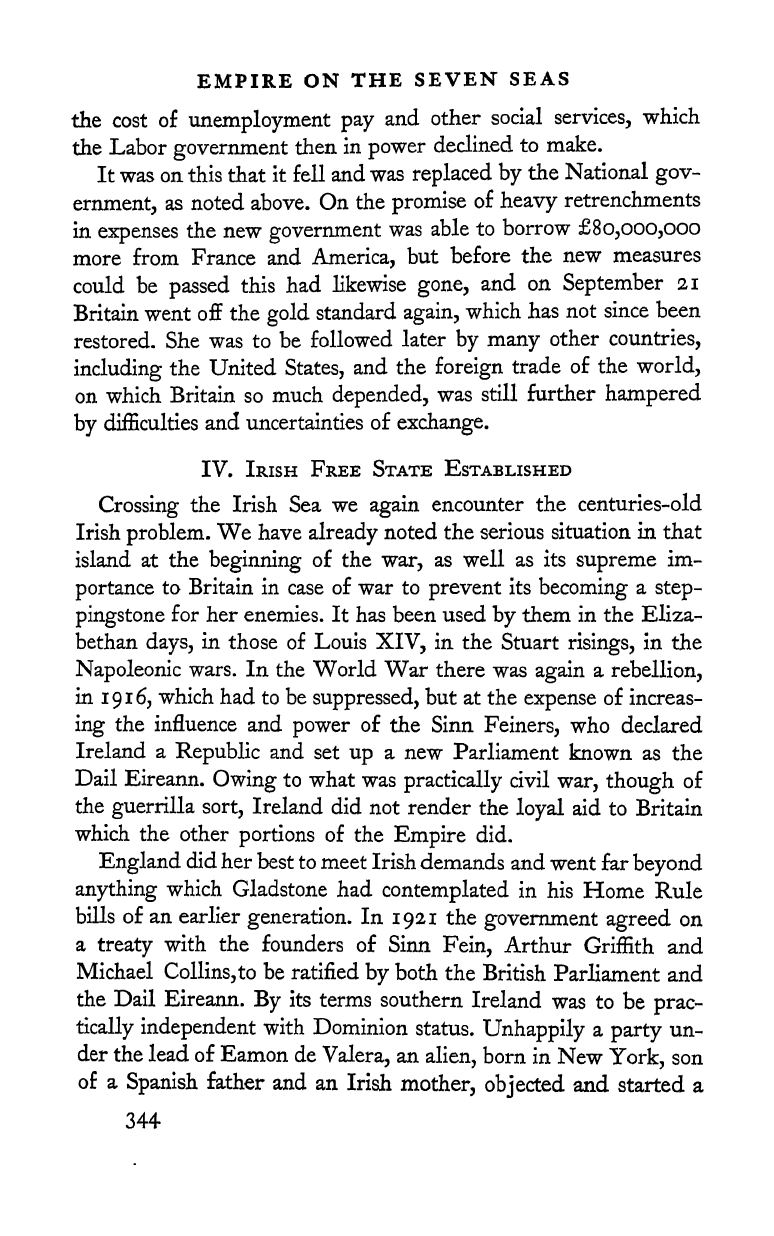
EMPIRE
ON
THE
SEVEN
SEAS
the cost
of
unemployment
pay
and
other
social
services,
which
the
Labor
government
then
in
power
declined
to
make.
It
was
on
this
that
it
fell and was
replaced
by
the
National
gov-
ernment,
as
noted above.
On
the
promise
of
heavy
retrenchments
in
expenses
the
new
government
was
able to
borrow
80,000,000
more from France
and
America,
but
before the
new
measures
could
be
passed
this had
likewise
gone,
and
on
September
21
Britain
went
off the
gold
standard
again,
which
has
not
since been
restored. She was
to
be
followed
later
by
many
other
countries,
including
the United
States,
and
the
foreign
trade
of the
world,
on
which
Britain so
much
depended,
was
still further
hampered
by
difficulties
and uncertainties
of
exchange.
IV.
IRISH
FREE STATE
ESTABLISHED
Crossing
the
Irish Sea
we
again
encounter the
centuries-old
Irish
problem.
We have
already
noted
the
serious situation
in that
island at the
beginning
of the
war,
as
well
as its
supreme
im-
portance
to
Britain
in
case
of
war
to
prevent
its
becoming
a
step-
pingstone
for
her
enemies. It has
been
used
by
them
in the Eliza-
bethan
days,
in
those of
Louis
XIV,
in
the Stuart
risings,
in
the
Napoleonic
wars.
In
the World War
there
was
again
a
rebellion,
in
1916,
which
had to be
suppressed,
but at the
expense
of
increas-
ing
the influence
and
power
of
the Sinn
Feiners,
who declared
Ireland
a
Republic
and
set
up
a
new
Parliament
known as the
Bail
Eireann.
Owing
to what
was
practically
civil
war,
though
of
the
guerrilla
sort,
Ireland did
not
render
the
loyal
aid to
Britain
which
the other
portions
of the
Empire
did.
England
did
her
best to
meet
Irish
demands
and
went far
beyond
anything
which
Gladstone
had
contemplated
in
his
Home
Rule
bills
of an earlier
generation.
In
1921
the
government
agreed
on
a
treaty
with
the
founders of
Sinn
Fein,
Arthur
Griffith and
Michael
Collins,
to
be
ratified
by
both
the
British
Parliament
and
the Dail Eireann.
By
its terms
southern
Ireland
was to
be
prac-
tically independent
with
Dominion
status.
Unhappily
a
party
un-
der
the lead
of Eamon
de
Valera,
an
alien,
born in
New
York,
son
of a
Spanish
father
and
an
Irish
mother,
objected
and
started a
344
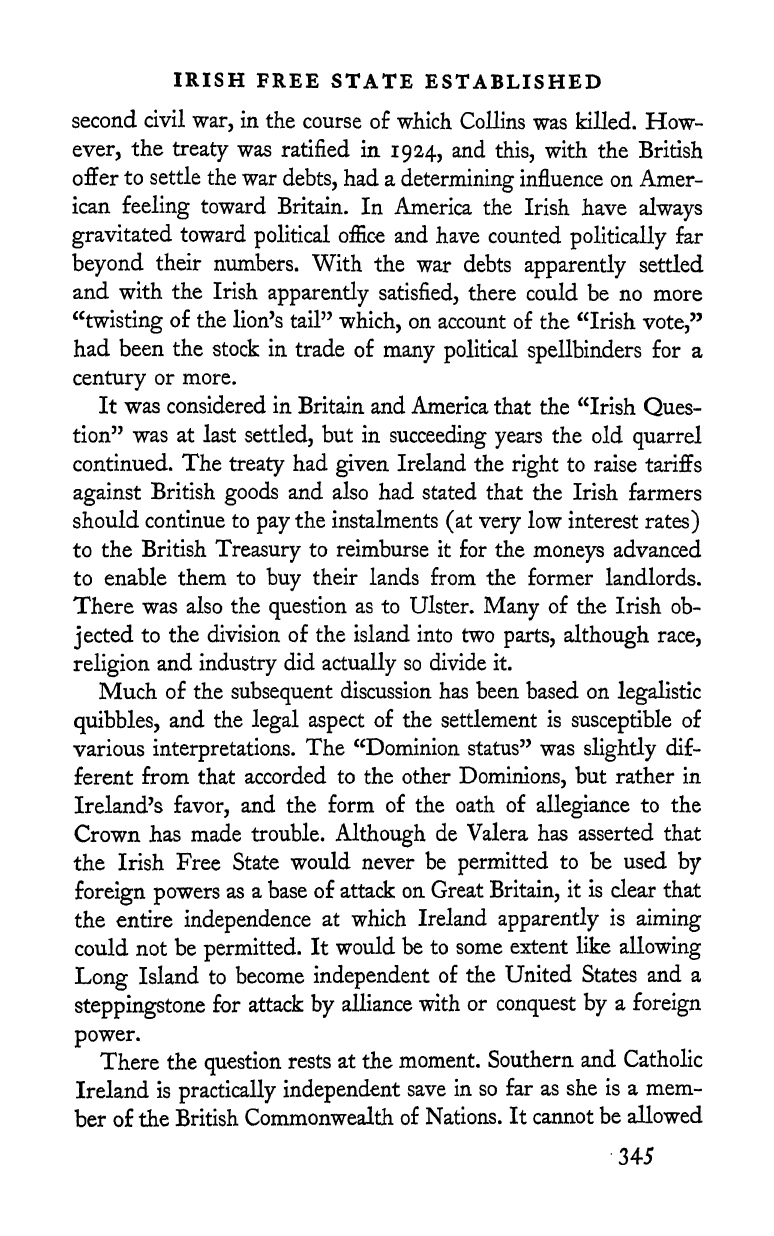
IRISH
FREE
STATE
ESTABLISHED
second
civil
war,
in
the
course
of
which
Collins
was killed. How-
ever,
the
treaty
was
ratified in
1924,
and
this,
with the
British
offer
to settle
the
war
debts,
had a
determining
influence on Amer-
ican
feeling
toward Britain.
In
America
the
Irish have
always
gravitated
toward
political
office
and
have
counted
politically
far
beyond
their
numbers.
With
the
war
debts
apparently
settled
and
with
the
Irish
apparently
satisfied,
there could
be no
more
"twisting
of
the
lion's
tail"
which,
on
account
of
the "Irish
vote,"
had
been
the
stock
in
trade
of
many
political spellbinders
for
a
century
or
more.
It was
considered in
Britain and
America
that the
"Irish
Ques-
tion"
was
at last
settled,
but
in
succeeding
years
the old
quarrel
continued.
The
treaty
had
given
Ireland the
right
to
raise tariffs
against
British
goods
and
also
had stated
that
the
Irish
farmers
should
continue
to
pay
the
instalments
(at
very
low interest
rates)
to
the
British
Treasury
to reimburse
it
for
the
moneys
advanced
to enable
them
to
buy
their lands
from the former
landlords.
There was
also the
question
as
to Ulster.
Many
of
the Irish
ob-
jected
to
the
division of
the
island into two
parts,
although
race,
religion
and
industry
did
actually
so
divide
it.
Much
of the
subsequent
discussion has
been
based
on
legalistic
quibbles,
and the
legal
aspect
of the
settlement
is
susceptible
of
various
interpretations.
The
"Dominion
status"
was
slightly
dif-
ferent
from that
accorded
to
the
other
Dominions,
but rather
in
Ireland's
favor,
and the
form
of the
oath of
allegiance
to the
Crown has
made
trouble.
Although
de
Valera
has asserted
that
the
Irish Free
State
would
never
be
permitted
to
be used
by
foreign
powers
as
a
base
of attack on
Great
Britain,
it
is clear that
the
entire
independence
at
which
Ireland
apparently
is
aiming
could
not
be
permitted.
It
would
be to some
extent
like
allowing
Long
Island to
become
independent
of the
United
States
and a
steppingstone
for
attack
by
alliance
with
or
conquest
by
a
foreign
power.
There
the
question
rests
at
the
moment.
Southern
and
Catholic
Ireland
is
practically
independent
save
in so
far
as she
is
a
mem-
ber of the
British
Commonwealth
of
Nations.
It cannot
be allowed
345
